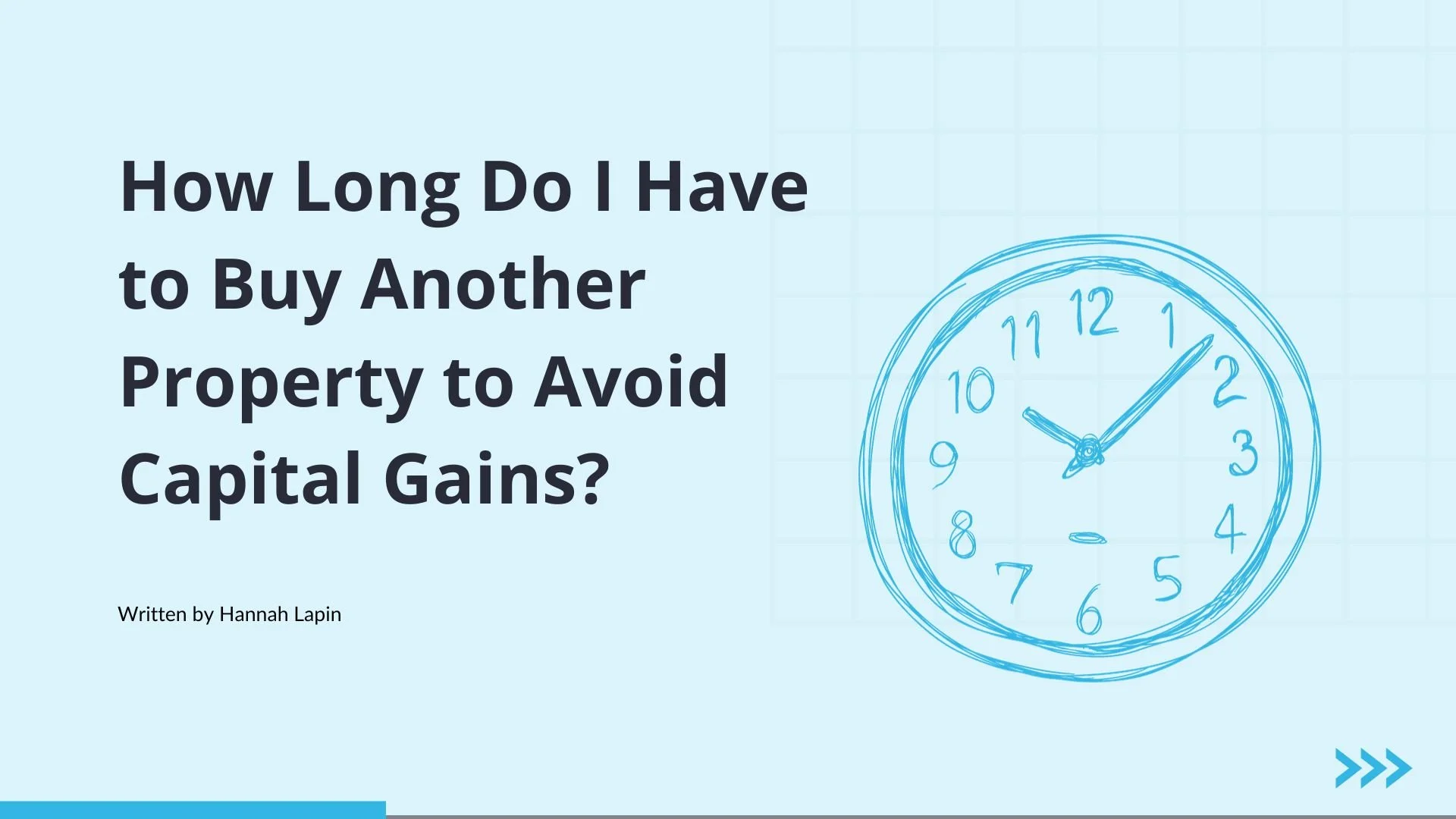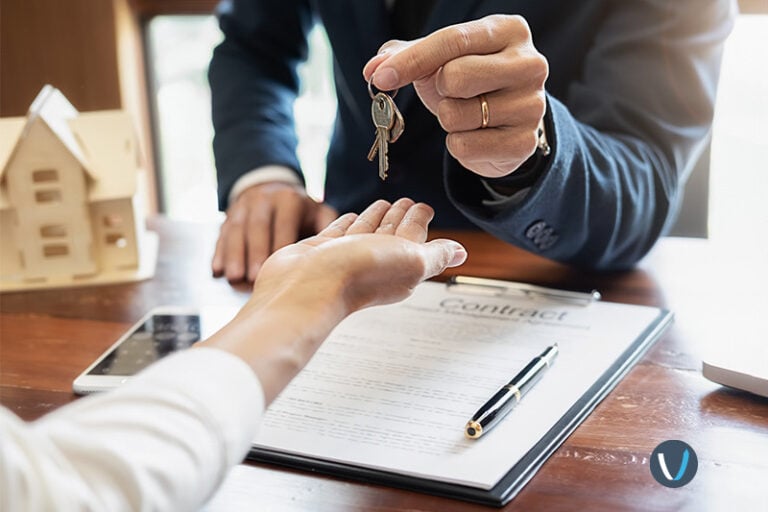Capital gains tax can be a serious thorn in an investor’s side, as it reduces the profit from the sale of a property. It’s one of the major tax liabilities of real estate investing, especially as the capital gains tax rate can be very high.
Thankfully, you can defer capital gains tax should you purchase another rental property within 180 days of the original investment property sale. There are also a variety of other options to lower your tax liabilities or avoid paying capital gains tax on your rental properties altogether.
What Is Capital Gains Tax?
Capital gains tax is a tax imposed on the profits from an asset, such as real estate, bonds, or stocks. They are progressive and based on your overall income. Those with a very low income may not pay capital gains tax at all, while high-income investors might pay as much as 20%.
How Does It Work?
There are two types of capital gains taxes: short-term and long-term.
Short-term capital gains have a tax rate based on the seller’s typical personal income, which is generally higher than that for long-term capital gains. Your rate for long-term capital gains will be determined by your taxable income, filing status, and how high the profits are from your investment property.
The Internal Revenue Service is responsible for calculating capital gains tax and applying tax law to the sale of investment capital.
Who Pays Capital Gains Taxes?
Individuals, businesses, and estates are all subject to capital gains taxes with certain exceptions. Those above retirement age do not have to pay the tax, and those working for the government in certain positions may be able to suspend their obligation for up to ten years.
How Much Is the Capital Gains Tax on a Property Sale?
The amount of the capital gains tax is on a time, income, and cost basis. Real estate kept for less than one year is taxed according to your tax bracket, which can be up to 37%.
If you have your property for more than a year, you’ll be taxed at 0%, 15%, or 20%, depending on your income.
Single people making under $44,626 or married couples making up to $89,251 won’t have to pay any capital gains tax. Single taxpayers with incomes of up to $492,300, or married couples with incomes up to $553,850, pay 15%. Anything above that, based on filing status, is taxed at 20%.
However, you can claim an exemption for up to $250,000 if you’re single or $500,000 if you’re filing with your spouse. You have to have lived in the property for at least two out of the last five years to claim this exemption.
How to Avoid Capital Gains Tax on Real Estate
The Internal Revenue Service (IRS) has several options for those who want to lower their capital gains taxes, which includes Section 121 and Section 1031. Taking advantage of these, and following prudent tax return tips like itemizing your expenses to maximize deductions, can save you thousands and help you generate income more efficiently.
A 121 Home Sale Exclusion (Primary Residence Exclusion)
This option allows you to avoid capital gain obligations from a home sale if it was used as a primary residence for a certain period of time. It’s an excellent way to retain most of the profits from the sale.
What Is It?
The 121 home sale exclusion lets you exclude a portion of the profits from taxation if you lived in the property for at least 24 months out of five years. Single filers can exclude up to $250,000, while couples filing jointly can exclude up to $500,000.
Specific Restrictions to Apply to a 121 Home Sale Exclusion
You must own the property you sold and use it as a primary residence for at least 24 months out of the previous 60 months. These months do not have to be consecutive. For example, if you lived in it for six months out of every year, this would make you eligible.
You can exclude up to the stated dollar amount based on how you file. If you only lived in it for 18 months, you may be able to claim 75% of the exclusion.
Time that the property was used for business purchases, such as a rental, isn’t eligible for the exclusion. In other words, if you use it as a rental for three out of five years, this portion of the sale is ineligible.
What Kind of Homes are Eligible for the Home Sale Exclusion?
Most residential real estate used as primary residences will be eligible. This can include single-family homes, mobile homes, houseboats, conversions, townhouses, and condominiums. If it is only a rental property or investment rather than a primary residence, it will not be eligible.
Are There Any Special Exemptions?
There are certain exemptions for those who have experienced a significant life change, such as health issues or a reduction in income, or are employed in certain professions within the US government, including service members, members of the intelligence community, and Peace Corps members.
In these circumstances, the two-to-five-year rule is suspended for up to ten years.
If an applicable individual is working in extended service of more than 90 days, they will avoid capital gains taxes as long as they lived in the home for at least two years within that ten year period. It doesn’t have to be foreign service, either, as long as they are stationed more than 50 miles away from the residence in question.
There are also exemptions for those who divorced their spouse or were widowed. A widower can claim the full $500,000 exemption if they sell their home within two years of the death. Those who transferred an investment property to an ex-partner will not have any tax obligations from this transfer.
How Much Can You Save With the Home Sale Exclusion?
If you’re buying a new property after selling your current residence, which you’ve lived in for at least two out of the last five years, you can save thousands of dollars in taxes, as evidenced by this example.
Assume you are a single filer making $50,000 per year. This would put you in the 15% bracket for long-term capital gains taxes. You purchased a home five years ago for $300,000, lived in it for 30 months, and you’re now selling it for $600,000.
The profit would be $300,000, but you can exclude up to $250,000. This means you’ll only be taxed on $50,000 of that profit. With a tax rate of 15%, you’ll only have to pay a $7,500 tax bill. If you could not make the exemption, your tax obligation would have been $45,000, meaning you saved $37,500 that can now be used for another investment.
Advantages of 121 Home Sale Exclusions
The primary advantage is that you save a significant chunk of money on your taxes, but the 121 exclusion also has other benefits. For example, there’s no age limit, and you don’t need to reinvest the funds.
There are also exceptions for those who suffered unforeseen circumstances like health issues, which helps them avoid depreciation recapture issues. Finally, it’s a straightforward exclusion that is very easy to apply.
A 1031 Like-Kind Exchange
For investors who want to avoid paying capital gains tax on an additional property, they can use the like-kind exchange option, which helps reduce the tax burden when buying new rental property.
What Is It?
Those who use the proceeds from one property to purchase a new property can claim an exclusion for a like-kind exchange. The new purchase must be a similar property, and it cannot be a primary residence.
How Does It Work?
This tax-deferred exchange allows you to avoid taxes if you buy a new property within 180 days using the proceeds of the original sale. It works whether you’re selling an investment property or a multifamily property that you also use as a primary residence.
You are deferring the tax burden until the next property is sold, at which time you’ll have to buy another property to continue the deferment.
When Selling An Investment Property
When selling investment properties with this exclusion, you need to use a Qualified Intermediary (QI), who will hold the funds until you buy the next investment. You’ll identify another property within 45 days and close on it within 180 days, at which time the QI will release the funds for the purchase.
For example, say that you made a $200,000 profit on a $500,000 sale, but then immediately purchased another house for $400,000 and a plot of land for $100,000. Assuming that the process was overseen by a Qualified Intermediary, you would not claim any capital gain from the original sale until you sell these two new properties.
When Selling a Multifamily Property That Is Also a Primary Residence
It’s important to note that you cannot use the primary residence and the like-kind exchange exclusion at the same time, so if you’re selling a multifamily primary residence, you’ll need to calculate which one will give you the best advantage.
For like-kind exchange, assume you and your spouse sold a $700,000 home, then bought two $350,000 properties. If the process was overseen correctly, you would not have to pay taxes on the sale until you sold the next properties.
Advantages of Like-Kind Exchanges
This is a great way to quickly reinvest while avoiding tax obligations, but it must be done within the timeframe, on similar properties, and with oversight by a QI. If done properly, it helps you avoid thousands of dollars in taxes.
Key Takeaways on Avoiding Capital Gains Tax
Avoiding capital gains tax helps you keep your personal finances strong, but it requires careful planning. Rely on tax professionals to help you decide which exclusions to use and assess the benefits before making any plans. You should also look for any exemptions that may assist you in reducing your tax burden.
Visio Lending is the nation’s leader in investment property loans. Talk to us today.
How do I avoid capital gains tax in the US?
Other than purchasing a property within 180 days, you can also avoid the capital gains tax by buying property with a retirement account, converting a rental property into a primary residence, utilizing tax harvesting, and leveraging Section 1031 of the IRS tax code to defer capital gains taxes. Owning the property for two years or more reduces your tax burden. Capital losses, as in selling the property for a loss, can also reduce your tax.
What are the exemptions for capital gains in the US?
Single taxpayers or those with the tax status of “married filing separately” can exclude up to $250,000 of capital gains. Those who are married filing jointly can exclude up to $500,000. You’ll also be exempted from capital gains tax if you have taxable income of $44,626 or less for single filers, while married filing jointly can have up to $89,251 of taxable income.
Can you avoid capital gains tax by buying another house?
Yes, if you sell one investment property and then immediately buy another, you can avoid capital gains tax using the Section 121 exclusion. However, you must reinvest the sale proceeds into a new real estate property to qualify.
What is the two-out-of-five-year rule?
The two-out-of-five year rule reduces your tax liability if you have owned and used a home as a primary residence for at least two out of five years of ownership. Real estate investors can purchase a rental property, live there for two years, then rent it out for the last three years of the period to use the entire capital gains tax exclusion. Married couples filing jointly must both reside in the property to get the entire $500,000 exclusion.
What is the $250,000 exclusion?
This exclusion allows those with a single tax filing status to avoid capital gain taxation on up to $250,000 if they sell an investment property that they have lived in for at least two out of five years. If your net profit was more than this, your taxable gain will be calculated as how much profit you made less $250,000.
What is the $250,000 exclusion?
This exclusion allows those with a single tax filing status to avoid capital gain taxation on up to $250,000 if they sell an investment property that they h
What counts as capital gains?
For tax purposes, a capital gain is any asset that you sell for a profit. You’ll owe taxes on investments like stocks and bonds, as well as physical property like houses, cars, boats, or land. There is an exception for certain types of collectible assets, which includes antiques, fine art, coins, or vintage wines. These will always be taxed at 28%, regardless of your ordinary income or filing status.
What triggers capital gains tax?
Capital gains taxes are triggered when you sell certain assets for a profit, which includes a primary residence, secondary residence, or vacation home.
Do I pay capital gains if I reinvest the proceeds from sale?
You can defer capital gains taxes by using a tax deferred exchange, which means that you reinvest the windfall from the sale into a replacement property. However, you need to act quickly. If you wait more than 180 days to reinvest, you will have to pay taxes on the proceeds.
Are dividends considered capital gains?
The Internal Revenue Service does not consider dividends as capital gains. If you sell dividends, you’ll be taxed at ordinary income tax rates rather than the capital gains tax rate.
What is the difference between short and long-term capital gains?
Capital gains are taxed at different rates depending on how long you have held them. Short term capital gains have been held for less than a year, and they have a higher tax liability. If you have held your investment property for over a year and then sell it, it is considered long term capital gains, which enables you to pay lower capital gains taxes.






